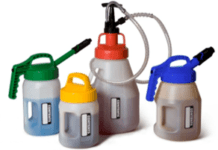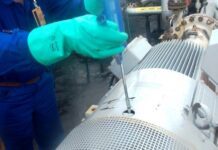
Marcos Thadeu Lobo
Mechanical Engineer Graduated from the State University of Campinas (Unicamp). He currently works as an Associate Consultant at the company QU4TTUOR CONSULTORIA.
Keeping machinery in good condition
Keeping machinery in good condition – Mobile or industrial equipment used in the operation of industrial plants or sites in mining or civil construction activities must be kept in the best possible service conditions so that maintenance costs are as low as possible and the reliability and availability of the machinery the highest. that can be obtained.
Figures 1/2 – Mobile and industrial machinery must be kept in the best possible service condition with a view to immediate availability
If the preservation and maintenance services for mobile and industrial equipment are not carried out properly, repair costs will tend to increase, making it necessary to acquire new machinery before the end of the expected service life. In other words, a vicious circle out of control.

 Figures 3/4 – Maintenance and unavailability costs: a vicious circle.
Figures 3/4 – Maintenance and unavailability costs: a vicious circle.
Below, 03 simple and practical suggestions will be discussed as a way to keep mobile and industrial equipment in operating conditions in order to ensure maximum availability and reliability that are sometimes neglected:
- MAKE REGULAR INQUIRIES TO THE PARTS CATALOG OR MACHINERY SERVICE MANUAL
When it becomes necessary to carry out an adjustment, carry out some type of maintenance or replace parts in mobile and industrial equipment, nothing can be more recommended than consulting the Equipment’s Parts Catalog or Service Manual. In these materials, we will be able to learn how to carry out regular and critical maintenance practices in the most technical and productive way possible, aiming at the best performance of the machinery and, mainly, in determining the ideal moment for such interventions to be carried out.
s.

 Figures 5/6 – Consult the Parts Catalog or Service Manual does not mean ignorance and should be performed despite experience.
Figures 5/6 – Consult the Parts Catalog or Service Manual does not mean ignorance and should be performed despite experience.
It is important to take as a reference the attitude of that lead mechanic who, despite having a lot of experience in the area of maintenance of mobile equipment, does not assemble any internal combustion engine Diesel Cycle 4T, final drive, hydraulic system, powershift transmission, etc. without having the Parts Catalog or Service Manual open in front of you as a reference. In addition, he also demanded that his subordinates adopt this practice and didactically reprimand those who did not.
Many assembly failures that cause catastrophic breakdowns, high and unnecessary maintenance costs and trivial failures that lead to the unavailability of machinery are due to banal mistakes that could have been avoided by merely consulting the Parts Catalog or Service Manual.

 Figures 7/8 – The Parts Catalog and Service Manual must be available to maintenance professionals.
Figures 7/8 – The Parts Catalog and Service Manual must be available to maintenance professionals.
Many mechanical maintenance professionals do not consult the Parts Catalog or Service Manual in the face of:
– not readily available
– overconfidence
– fear of thinking that they do not have sufficient knowledge of their professional attributions.
2. EFFICIENT MAINTENANCE AND ASSEMBLY OF MACHINERY DEMANDS ADEQUATE TOOLING AND TRAINING
Many professionals in the mechanical maintenance area do not perform their jobs satisfactorily due to:
– the companies they work for do not provide them with their own tools for the satisfactory performance of their tasks;
– the tooling is available but they are not trained in its use;
– having learned outdated maintenance practices from “more experienced” professionals;
– this is the maintenance culture practiced by their superiors.
Figures 9/10 – Own tooling and adequate training are essential for good maintenance and assembly practices.
- PERFORM THE LUBRICATION OF MOBILE AND INDUSTRIAL EQUIPMENT AS RECOMMENDED IN THE SERVICE MANUALSThe need to properly lubricate mobile and industrial equipment in order to obtain the best performance is widely known by professionals working in the mechanical maintenance area. However, the OEMs’ recommendations regarding service intervals in relubrication, the type of lubricant to be used and the way to perform the lubrication services are not always followed, as a consequence of this, early and costly failures.
The fact is that, despite much talk about the subject, the relationship between the lack of lubrication of components in relative motion, the wear of metallic surfaces, catastrophic failures and unavailability of mobile and industrial machinery is still not given due importance.
 Figure 11 – Lubrication and wear mechanisms of components in relative motion.
Figure 11 – Lubrication and wear mechanisms of components in relative motion.
Let’s imagine two metallic surfaces in relative motion without any kind of lubrication. Without a lubricant to separate them, the metal surfaces of the machine elements rub together and heat up.
This process causes the non-lubricated metal surfaces to wear out by cold welding and suffer from material pullout until the point where the advanced wear situation will lead to the unavailability of the machinery.
In light of this, we can say that in order to achieve longevity, maximum availability and reliability in mobile and industrial machinery we must:
– lubricate the equipment at the service intervals prescribed by the OEM
– use suitable lubricants for the application
– lubricate by suitable means in order to avoid contamination of lubricants during relubrication services
– take care of the volumes used in relubrication tasks so that there is no excess or deficiency
– keep lubricants free from contamination (eg water, abrasive solid particulate matter)
– check that the operating temperatures of the lubricants are adequate
Figures 12/13 – Machines need proper maintenance care, otherwise they fail when we need them the most.
The machinery in industrial plants and mobile equipment sites are key parts in the activities of companies and when it is not well maintained, the operational health of the business is seriously compromised, being vital for maximum availability and reliability in mobile and industrial machinery. that maintenance technicians have the necessary conditions and training to properly perform maintenance services.





















